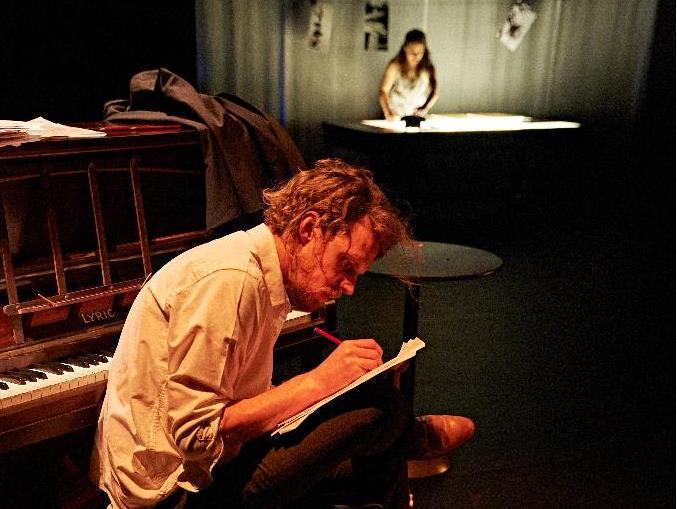Photo by Jon Green
Across an art gallery, their eyes meet. The passionate French photographer captures the imagination of the quiet Australian pianist, and he toils at his keyboard, pursuing the perfect composition inspired by that shared gaze. While he never feels satisfied with the music, chance brings them together again, and love and life together blooms. The pair rush headlong into the sweetest phases of infatuation, not noticing the other stories offering clues elsewhere. While “life is love” is a noble declaration, this young couple are not the first to find that it will not pay the bills. Family loss and intense homesickness drive her back to France, leaving him bereft and silent without her.
Felix Jozeps delivers the young pianist with unrelenting intensity and delicate concentration while playing. His near wordless performance of the second part is devastating in effect, but remains clear in intent and focus throughout the nightmarish sequences of his search for his lost love. While initial chemistry between Jozeps’ pianist and the photographer played by Astrid Grant is a little shaky, the relationship becomes more believable as it increases in intensity. Grant maintains a fine French accent throughout, especially beautifully in her rants about Australian (lack of) history and culture. Her symbolic performances in the second part are compelling and distressing, speaking not only for those moments but for the success of her development of audience engagement with her character in the longer first part.
In the role of the kind yet enigmatic florist, Jacinta Larcombe delivers a stand out performance. Her physical control of face and body delivers a fascinating combination in a character which could easily become sidelined with a less compelling performance. Her sympathy plays well against the characters played by Sarah Nelson and Thomas Papathanassiou, as well as her timeless compassion for the pianist, whether played by Jozeps or George Shevtsov. Shevtsov occupies his part graciously, not overplaying mysterious parallels but allowing them to gently fall into place over the course of the narrative. Nelson and Papathanassiou are versatile in their various functional side roles, assisting the story’s flow.
Gorgeous costuming from Aurelio Costarella and Fleur Kingsland complements Bruce McKinven’s sparsely functional set design, drawing the eye and embellishing the performance without distracting from it. Nick Wales’ densely harmonious musical compositions can become quite loud – while this works well during many parts without spoken lines, it makes some dialogue difficult to follow. Wales’ music works with Ben Collins’ sympathetic sound design to guide the story and take the audience from scene to scene, Director Melissa Cantwell allowing space for atmosphere and audience imagination to fill in gaps rather than over-explaining each detail.
While the first part is so gently-paced that the story nearly glides to a stop at times, the poignant details introduced all return with a vengeance after the interval to bombard the audience with emotional moments, paced with all the vivid vigour of a dream. Cantwell has invested a strong vision and artistic sensibility into this piece, and delivered with the experienced clarity of direction needed to prevent it collapsing into a symphony of vagueness. The Song was Wrong will frustrate audiences looking for a quick dramatic fix, but will reward those who invest patience and wait for its whimsical muse.
Rating: 4 out of 5 stars
The Song was Wrong
By Melissa Cantwell
Presented by Perth Theatre Company
Directed by Melissa Cantwell
Performed by Astrid Grant, Felix Joseps, Jacinta Larcombe, Sarah Nelson, Thomas Papathanassiou and George Shevtsov
Studio Underground, State Theatre Centre of WA, Perth Cultural Centre
4-20 June 2015





